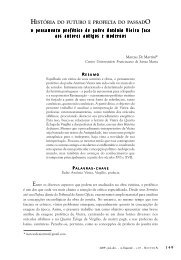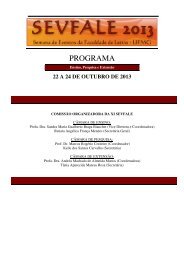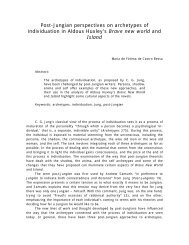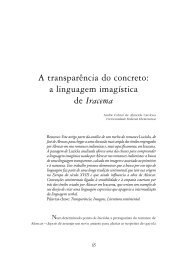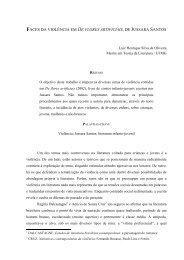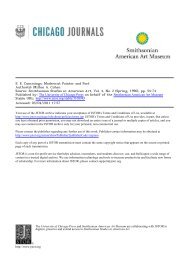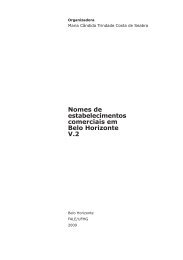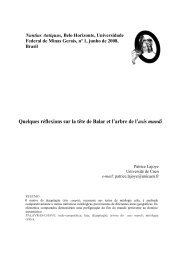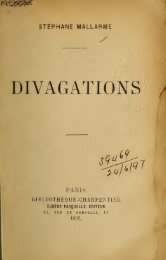Contornos do Indizível: o estilo de Clarice Lispector - Fale - UFMG
Contornos do Indizível: o estilo de Clarice Lispector - Fale - UFMG
Contornos do Indizível: o estilo de Clarice Lispector - Fale - UFMG
You also want an ePaper? Increase the reach of your titles
YUMPU automatically turns print PDFs into web optimized ePapers that Google loves.
196<br />
Em Tese, Belo Horizonte, v. 10, p. 196-201, <strong>de</strong>z. 2006<br />
Excavating the Past: Rememories and Healing in Toni<br />
Morrison’s Beloved<br />
Abstract<br />
Disponível em http://www.letras.ufmg.br/poslit<br />
Rosilene Cássia Freitas <strong>de</strong> Aquino<br />
This essay discusses the possibility of the combination of the<br />
social with the aesthetic functions of African American<br />
literature. It analyses how the main characters of Morrison’s<br />
Beloved are portrayed not just as individual and fictional types,<br />
but also as collective and historical ones, through which African<br />
American historical memory and culture are revealed in slavery<br />
time.<br />
Key words: African American history. Rememories. Healing. Slavery.<br />
The <strong>de</strong>dication of Toni Morrison’s Beloved –“Sixty Million and more”– reveals Toni<br />
Morrison’s concern with African American history. Her novel is <strong>de</strong>dicated to Africans<br />
and African American slaves who suffered and were mur<strong>de</strong>red throughout the historical<br />
period of The Middle Passage and Slavery. Beloved exemplifies Morrison’s view of the<br />
possibility of combination of the social with the aesthetic functions of African American<br />
literature: it has to be beautiful and “unquestionably political” (Wal<strong>de</strong>r 332). Morrison’s<br />
narrative bears witness of the historical past of slavery in the United States. In<br />
Beloved, which I see as a living chronicle of slavery, Morrison’s characters, specifically<br />
the character called Beloved, can be seen not just as individual and fictional types, but<br />
also as collective and historical ones, which represent their ancestors and community<br />
in the slavery time. Through Beloved’s presence and actions within the narrative, and<br />
also by the use of an outstanding imagery, metaphors, supernatural elements, oral<br />
tradition, and the African American views of time and reality, Morrison remembers and<br />
unveils a past that still remains partially obscure, distorted, and inaccessible to the<br />
American society, specially to African Americans who had been <strong>de</strong>nied their own<br />
history.<br />
Concerning the importance of the social and political role of literature for people<br />
of African <strong>de</strong>scent, Michael Ryan emphasizes that African American writers, among<br />
them Toni Morrison, are naturally engaged in cultural and political issues, such as<br />
“inter-ethnic relations, racial i<strong>de</strong>ntity, homeland, exile, Diaspora, nationhood” (147),<br />
among others. According to Ryan’s view, it is relevant to mention that, in Morrison’s<br />
Beloved, African American cultural and political issues can be distinguished in the way<br />
her characters are portrayed in or<strong>de</strong>r to reveal not only their personal and collective



